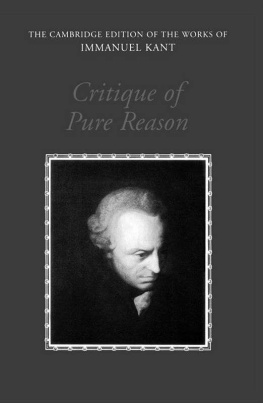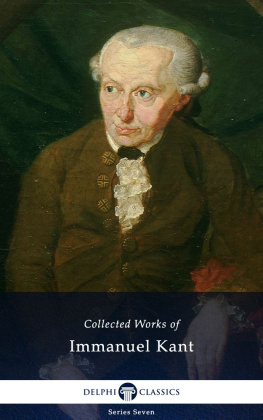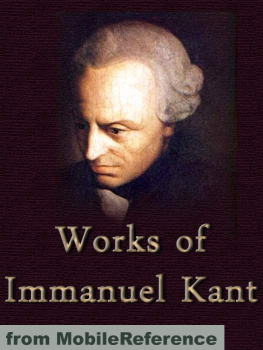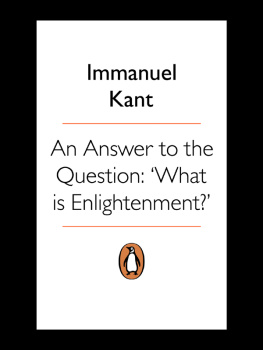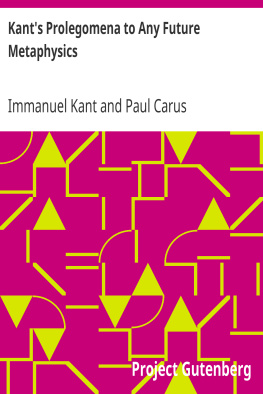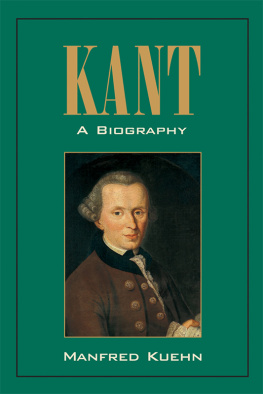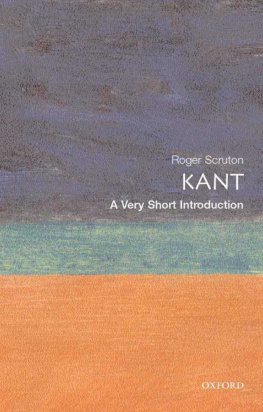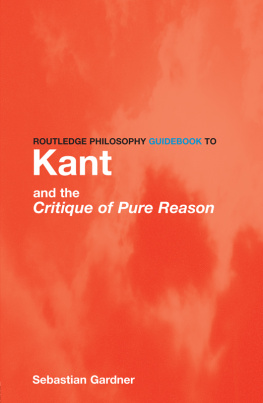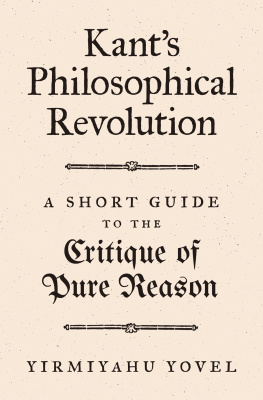Immanuel Kant - The Critique of Pure Reason
Here you can read online Immanuel Kant - The Critique of Pure Reason full text of the book (entire story) in english for free. Download pdf and epub, get meaning, cover and reviews about this ebook. year: 2003, genre: Science. Description of the work, (preface) as well as reviews are available. Best literature library LitArk.com created for fans of good reading and offers a wide selection of genres:
Romance novel
Science fiction
Adventure
Detective
Science
History
Home and family
Prose
Art
Politics
Computer
Non-fiction
Religion
Business
Children
Humor
Choose a favorite category and find really read worthwhile books. Enjoy immersion in the world of imagination, feel the emotions of the characters or learn something new for yourself, make an fascinating discovery.

- Book:The Critique of Pure Reason
- Author:
- Genre:
- Year:2003
- Rating:3 / 5
- Favourites:Add to favourites
- Your mark:
- 60
- 1
- 2
- 3
- 4
- 5
The Critique of Pure Reason: summary, description and annotation
We offer to read an annotation, description, summary or preface (depends on what the author of the book "The Critique of Pure Reason" wrote himself). If you haven't found the necessary information about the book — write in the comments, we will try to find it.
The Critique of Pure Reason — read online for free the complete book (whole text) full work
Below is the text of the book, divided by pages. System saving the place of the last page read, allows you to conveniently read the book "The Critique of Pure Reason" online for free, without having to search again every time where you left off. Put a bookmark, and you can go to the page where you finished reading at any time.
Font size:
Interval:
Bookmark:
The Project Gutenberg EBook of The Critique of Pure Reason, by Immanuel Kant
This eBook is for the use of anyone anywhere at no cost and with
almost no restrictions whatsoever. You may copy it, give it away or
re-use it under the terms of the Project Gutenberg License included
with this eBook or online at www.gutenberg.net
Title: The Critique of Pure Reason
Author: Immanuel Kant
Release Date: July, 2003 [EBook #4280]
Last Updated: February 5, 2018
Language: English
*** START OF THIS PROJECT GUTENBERG EBOOK THE CRITIQUE OF PURE REASON ***
Produced by Charles Aldarondo and David Widger
Human reason, in one sphere of its cognition, is called upon to consider questions, which it cannot decline, as they are presented by its own nature, but which it cannot answer, as they transcend every faculty of the mind.
It falls into this difficulty without any fault of its own. It begins with principles, which cannot be dispensed with in the field of experience, and the truth and sufficiency of which are, at the same time, insured by experience. With these principles it rises, in obedience to the laws of its own nature, to ever higher and more remote conditions. But it quickly discovers that, in this way, its labours must remain ever incomplete, because new questions never cease to present themselves; and thus it finds itself compelled to have recourse to principles which transcend the region of experience, while they are regarded by common sense without distrust. It thus falls into confusion and contradictions, from which it conjectures the presence of latent errors, which, however, it is unable to discover, because the principles it employs, transcending the limits of experience, cannot be tested by that criterion. The arena of these endless contests is called Metaphysic.
Time was, when she was the queen of all the sciences; and, if we take the will for the deed, she certainly deserves, so far as regards the high importance of her object-matter, this title of honour. Now, it is the fashion of the time to heap contempt and scorn upon her; and the matron mourns, forlorn and forsaken, like Hecuba:
Modo maxima rerum,
Tot generis, natisque potens...
Nunc trahor exul, inops.
Ovid, Metamorphoses. xiii
At first, her government, under the administration of the dogmatists, was an absolute despotism. But, as the legislative continued to show traces of the ancient barbaric rule, her empire gradually broke up, and intestine wars introduced the reign of anarchy; while the sceptics, like nomadic tribes, who hate a permanent habitation and settled mode of living, attacked from time to time those who had organized themselves into civil communities. But their number was, very happily, small; and thus they could not entirely put a stop to the exertions of those who persisted in raising new edifices, although on no settled or uniform plan. In recent times the hope dawned upon us of seeing those disputes settled, and the legitimacy of her claims established by a kind of physiology of the human understandingthat of the celebrated Locke. But it was found thatalthough it was affirmed that this so-called queen could not refer her descent to any higher source than that of common experience, a circumstance which necessarily brought suspicion on her claimsas this genealogy was incorrect, she persisted in the advancement of her claims to sovereignty. Thus metaphysics necessarily fell back into the antiquated and rotten constitution of dogmatism, and again became obnoxious to the contempt from which efforts had been made to save it. At present, as all methods, according to the general persuasion, have been tried in vain, there reigns nought but weariness and complete indifferentismthe mother of chaos and night in the scientific world, but at the same time the source of, or at least the prelude to, the re-creation and reinstallation of a science, when it has fallen into confusion, obscurity, and disuse from ill directed effort.
For it is in reality vain to profess indifference in regard to such inquiries, the object of which cannot be indifferent to humanity. Besides, these pretended indifferentists, however much they may try to disguise themselves by the assumption of a popular style and by changes on the language of the schools, unavoidably fall into metaphysical declarations and propositions, which they profess to regard with so much contempt. At the same time, this indifference, which has arisen in the world of science, and which relates to that kind of knowledge which we should wish to see destroyed the last, is a phenomenon that well deserves our attention and reflection. It is plainly not the effect of the levity, but of the matured judgement* of the age, which refuses to be any longer entertained with illusory knowledge, It is, in fact, a call to reason, again to undertake the most laborious of all tasksthat of self-examination, and to establish a tribunal, which may secure it in its well-grounded claims, while it pronounces against all baseless assumptions and pretensions, not in an arbitrary manner, but according to its own eternal and unchangeable laws. This tribunal is nothing less than the critical investigation of pure reason.
[*Footnote: We very often hear complaints of the shallowness of the present age, and of the decay of profound science. But I do not think that those which rest upon a secure foundation, such as mathematics, physical science, etc., in the least deserve this reproach, but that they rather maintain their ancient fame, and in the latter case, indeed, far surpass it. The same would be the case with the other kinds of cognition, if their principles were but firmly established. In the absence of this security, indifference, doubt, and finally, severe criticism are rather signs of a profound habit of thought. Our age is the age of criticism, to which everything must be subjected. The sacredness of religion, and the authority of legislation, are by many regarded as grounds of exemption from the examination of this tribunal. But, if they are exempted, they become the subjects of just suspicion, and cannot lay claim to sincere respect, which reason accords only to that which has stood the test of a free and public examination.]
I do not mean by this a criticism of books and systems, but a critical inquiry into the faculty of reason, with reference to the cognitions to which it strives to attain without the aid of experience; in other words, the solution of the question regarding the possibility or impossibility of metaphysics, and the determination of the origin, as well as of the extent and limits of this science. All this must be done on the basis of principles.
This paththe only one now remaininghas been entered upon by me; and I flatter myself that I have, in this way, discovered the cause ofand consequently the mode of removingall the errors which have hitherto set reason at variance with itself, in the sphere of non-empirical thought. I have not returned an evasive answer to the questions of reason, by alleging the inability and limitation of the faculties of the mind; I have, on the contrary, examined them completely in the light of principles, and, after having discovered the cause of the doubts and contradictions into which reason fell, have solved them to its perfect satisfaction. It is true, these questions have not been solved as dogmatism, in its vain fancies and desires, had expected; for it can only be satisfied by the exercise of magical arts, and of these I have no knowledge. But neither do these come within the compass of our mental powers; and it was the duty of philosophy to destroy the illusions which had their origin in misconceptions, whatever darling hopes and valued expectations may be ruined by its explanations. My chief aim in this work has been thoroughness; and I make bold to say that there is not a single metaphysical problem that does not find its solution, or at least the key to its solution, here. Pure reason is a perfect unity; and therefore, if the principle presented by it prove to be insufficient for the solution of even a single one of those questions to which the very nature of reason gives birth, we must reject it, as we could not be perfectly certain of its sufficiency in the case of the others.
Font size:
Interval:
Bookmark:
Similar books «The Critique of Pure Reason»
Look at similar books to The Critique of Pure Reason. We have selected literature similar in name and meaning in the hope of providing readers with more options to find new, interesting, not yet read works.
Discussion, reviews of the book The Critique of Pure Reason and just readers' own opinions. Leave your comments, write what you think about the work, its meaning or the main characters. Specify what exactly you liked and what you didn't like, and why you think so.

